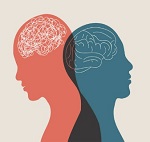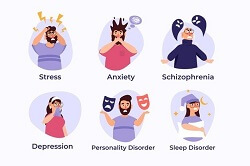Mental Health DefinitionConcept of mental healthMental health refers to a person's overall psychological well-being and encompasses a range of emotional, behavioural, and cognitive aspects. It affects how a person thinks, feels, and acts and plays a critical role in determining one's quality of life. Good mental health helps people to lead fulfilling and productive lives, whereas poor mental health can lead to a range of problems, such as anxiety, depression, and substance abuse. Mental health is a complex and multifaceted concept that is influenced by many factors, including biology, psychology, and social and environmental factors. There is no single definition of mental health that captures all of its different aspects, but it is generally understood to refer to a state of well-being in which an individual is able to realize their own abilities, cope with normal life stressors, and work productively. 
One of the key features of good mental health is resilience. Resilience is adapting and recovering from difficult life events, such as loss, trauma, and stress. People who are resilient are better able to manage stress and overcome challenges, and they are less likely to develop mental health problems. Factors that contribute to resilience include social support, self-esteem, optimism, and problem-solving skills. In contrast, poor mental health is characterized by a range of negative emotions and behaviours, including anxiety, depression, irritability, anger, and mood swings. People with poor mental health may struggle to cope with stress and struggle to form and maintain relationships. They may also experience a range of physical symptoms, such as fatigue, headaches, and muscle pain. There are many factors that can contribute to poor mental health, including biological factors, such as genetics, chemical imbalances in the brain, and physical illness. Psychological factors, such as stress, trauma, and life events, can also play a role, as can social and environmental factors, such as poverty, unemployment, and homelessness. Treatment for mental health problems can vary depending on the severity and type of the problem. Mild to moderate mental health problems may be treated through lifestyle changes, such as exercise, healthy eating, and stress management techniques. More severe mental health problems may require medication and/or therapy, such as cognitive-behavioural therapy (CBT) or dialectical behaviour therapy (DBT). It is important to note that mental health is not just the absence of mental illness. Mental health is a dynamic state that can change over time and can be influenced by many factors. Therefore, it is important to maintain good mental health by engaging in activities that promote well-being and reduce stress, such as exercise, socializing, and mindfulness practices. Concept of mental illnessThe phrase "mental illness" is very broad and covers a wide range of illnesses that have an impact on your feelings and thoughts. It may also make it harder for you to function normally day to day. Several factors, such as the following, can have an impact on mental illnesses:
Mental health statisticsMental health is a significant issue in India, with a large proportion of the population suffering from various mental health disorders. According to the World Health Organization (WHO), approximately 150 million people in India are affected by mental disorders, and more than two-thirds of these individuals do not receive any treatment. This is due to a lack of awareness, stigma, and a shortage of mental health resources. In India, the most common mental health disorders are depression, anxiety, and schizophrenia. Depression affects an estimated 57 million people in India, making it one of the leading causes of disability in the country. Anxiety disorders are also prevalent, affecting an estimated 40 million people. Schizophrenia affects approximately 2.5 million people in India and is a major contributor to disability and the burden of disease. Despite the high prevalence of mental health disorders in India, only about 10% of people with mental illness receive treatment. This is largely due to the lack of mental health facilities, shortage of mental health professionals, and stigma surrounding mental illness. The government of India has taken steps to address the mental health crisis by implementing various programs and initiatives, but there is still much work to be done. Mental health is a critical issue in India, with millions of people suffering from mental health disorders. To address this issue, it's essential to increase awareness, reduce stigma, and improve access to mental health resources. Disorders related to mental healthMental disorders are conditions that affect a person's thinking, feeling, behaviour, or mood and cause significant distress or impairment in daily life. Mental disorders are common and can range from mild to severe, and they can affect people of all ages, cultures, and backgrounds. 
DepressionDepression is a common mental disorder that is characterized by feelings of sadness, hopelessness, and loss of interest in activities that were once enjoyable. Depression can interfere with daily life, causing difficulty in work, relationships, and overall functioning. Symptoms of depression can include changes in appetite, sleep patterns, fatigue, and difficulty concentrating. Treatment for depression typically involves medication and/or therapy, such as cognitive-behavioural therapy (CBT) or interpersonal therapy (IPT). Anxiety disordersAnxiety disorders are a group of mental disorders characterized by excessive and persistent worry, fear, and nervousness. Common types of anxiety disorders include generalized anxiety disorder (GAD), panic disorder, and social anxiety disorder. Symptoms of anxiety disorders can include sweating, rapid heartbeat, trembling, and avoidance of certain situations. Treatment for anxiety disorders typically involves therapy, medication, or a combination of both. Bipolar disorderBipolar disorder is a mental disorder characterized by extreme swings in mood, energy, and behaviour. People with bipolar disorder experience periods of mania or hypomania, during which they feel excessively happy, energetic, and productive, and periods of depression, during which they feel sad, hopeless, and have difficulty functioning. Symptoms of bipolar disorder can include rapid speech, increased physical activity, decreased need for sleep, and reckless behaviour. Treatment for bipolar disorder typically involves medication, therapy, and lifestyle changes. SchizophreniaSchizophrenia is a severe mental disorder characterized by a range of symptoms, including delusions, hallucinations, disordered thinking, and abnormal behaviour. People with schizophrenia may have difficulty distinguishing reality from fantasy, and they may experience symptoms such as hearing voices, seeing things that aren't there and having strange beliefs. Treatment for schizophrenia typically involves medication, therapy, and support from family and friends. Post-traumatic stress disorder (PTSD)PTSD is a mental disorder that can occur after a traumatic event, such as a natural disaster, a car accident, or military combat. Symptoms of PTSD can include intrusive thoughts or memories of the traumatic event, avoidance of reminders of the event, and increased feelings of anxiety and irritability. Treatment for PTSD typically involves therapy, medication, or a combination of both. Eating disordersEating disorders are a group of mental disorders characterized by abnormal eating behaviours, such as overeating, undereating, and/or preoccupation with body weight and shape. Common types of eating disorders include anorexia nervosa, bulimia nervosa, and binge eating disorder. Symptoms of eating disorders can include changes in appetite, preoccupation with food, distorted body image, and abnormal weight changes. Treatment for eating disorders typically involves therapy, medication, and nutritional counselling. Obsessive-compulsive disorder (OCD)OCD is a mental disorder characterized by unwanted and intrusive thoughts (obsessions) that drive repetitive behaviours (compulsions). People with OCD may have recurring thoughts about cleanliness, order, or harm, and they may engage in repetitive behaviours, such as hand washing or checking locks, to reduce their anxiety. Treatment for OCD typically involves therapy, medication, or a combination of both. Attention-deficit/hyperactivity disorder (ADHD)ADHD is a mental disorder characterized by difficulties with attention, hyperactivity, and impulsivity. Children with ADHD may have trouble paying attention in school, following directions, and completing tasks. Adults with ADHD may have difficulty organizing and completing tasks, managing time, and maintaining focus. Treatment for ADHD typically involves medication, therapy, and lifestyle changes. How to deal with mental health related problemsDealing with mental health can be challenging, but it's important to remember that help is available. Here are a few steps you can take to manage your mental health:
Remember, it's okay to ask for help and it's never too late to start taking care of your mental health.
Next TopicParts of Speech Definitions
|
 For Videos Join Our Youtube Channel: Join Now
For Videos Join Our Youtube Channel: Join Now
Feedback
- Send your Feedback to [email protected]
Help Others, Please Share










